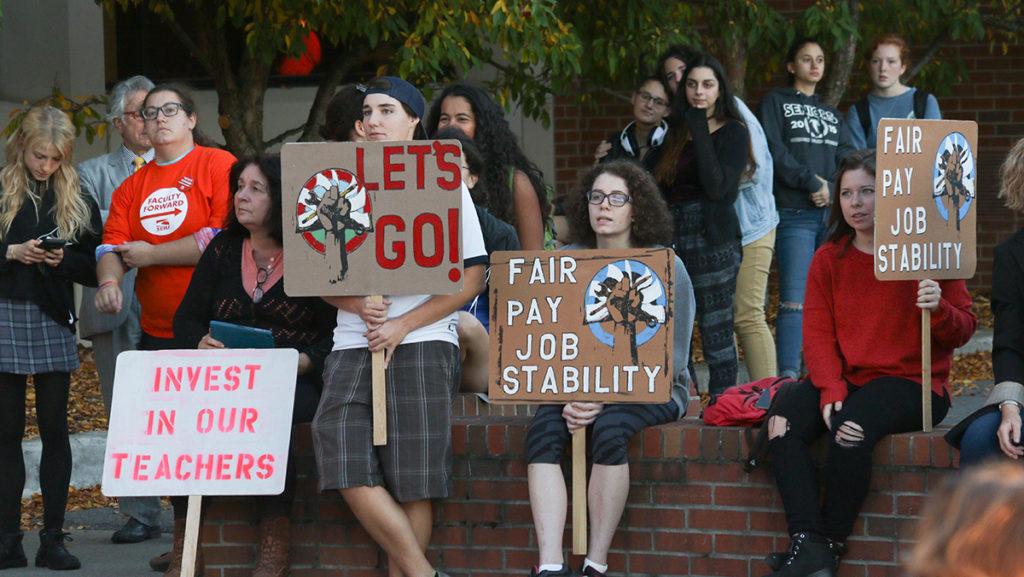On Oct. 19, 2016, the Ithaca community gathered around Free Speech Rock for a rally in support of our contingent faculty. It’s now been over three months and the movement for equitable rights for our part-time contingent faculty is coming to a boiling point.
The administration has continued to delay any kind of action moving towards reasonable compensation for our part-time faculty. Though Ithaca College’s bargaining committee has indicated that they will continue to negotiate in ‘good faith,’ we are beginning to grasp that the administration has deferred any significant action or real changes on this issue. The college bargaining committee’s fixation on ‘meaningful dialogue’ has been nothing but a hoax, as we see that no steps toward significant action have been implemented.
“Reasonable compensation” has been defined by our part-time faculty as pay parity with the lowest paid full-time faculty member. This means that a part-time faculty member will be paid the same amount for teaching the same exact course regardless of their status as part-time or full-time (equal pay, for equal work). For faculty on contingent one-year contracts, the most important issue on the table is adequate job security. Although part-time contingent and one-year contract contingent members have differing priorities within their compensation proposals, all contingent faculty deserve a voice on our campus and the right to preserve their dignity within the work that they do for this institution and for students.
The college’s negotiations with the union have been marked by four things: meaningless dialogue with top-down compromises, delayed action in making impactful changes, absent accountability for their actions, and a seeming inability to communicate with the larger community. By disconnecting from their own community, we can see how their attitudes highly resonate with “business as usual” approaches. Not coincidentally, the administration’s current appeasements are strikingly similar to how they dealt with campus protests in Fall 2015 regarding racism.
If contingent faculty members vote to authorize a strike, and then go on strike, students should understand the intentions and implications of this act and consider this as a part of their fight for equity as well.
Some students have voiced legitimate concerns that a strike would ultimately be counterproductive, a waste of our tuition dollars, and an impediment to our education. What must be acknowledged are the curriculum flaws, unstable departments, and faculty transience that result from producing trivial solutions in regards to compensation for the contingent faculty. This causes a revolving door of professors coming in, leaving, and temporarily filling other positions. The labor conditions of our contingent faculty, by extension, affects students who are dependent on professors who lack job security, have limiting campus presence, and are undervalued by this administration.
Part-time contingent faculty (33% of professors at IC) salaries comprise less than 2% of the school’s budget, forcing the question of who is actually benefiting from this system, if not the students or faculty? Students who are concerned with rising tuition should be highly suspicious of this administration and demand to know how their tuition dollars could be equitably dispersed to help invest in the professors who invest in us.
While administrators claim that they strive to make this campus a more inclusive community, they easily expose their hypocrisy when they neglect their own faculty members and students. The students, faculty, and staff make IC a more inclusive environment — not the administration. If this administration hopes to create positive change, they should acknowledge how they have failed to embody this value they so vehemently preach. I advise our leaders to uphold this value for the betterment of this college and to further set an example by fighting the corporatization of higher ed. As we strive for a more inclusive environment, we, the students, ought to continue to stand in solidarity with the marginalized communities of IC, starting now, with our contingent faculty members.














